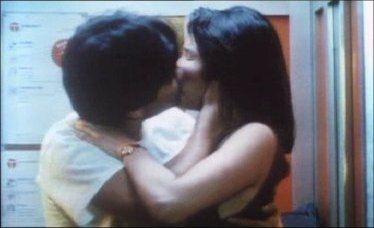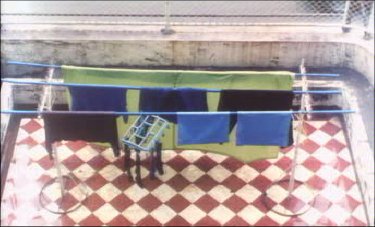|
Text and layout © Ed Shum, 2003. Ed Shum asserts the moral right to be identified as the author of this work |
|
Long Reviews |
|
Review and analysis of As Tears Go By |
|
Wong Kar Wai’s debut movie as director is perhaps his least remembered film. It is not difficult to see why, as the flavour is markedly different to his later, daring cinematic formulations. However, As Tears Go By was clearly a success, both at the Hong Kong box office and with local film critics, and this ensured WKW the opportunity to continue making films. For WKW though, Tears did not reflect the mode of film-making he wanted, and so he left its style behind in later films, making it the oddity in his back catalogue. |
|
Having said this, the film still bears some of the hallmarks associated with WKW, and it is interesting to see how he changed and adapted after this film. For one thing, afterwards he started to collaborate with cinematographer Chris Doyle - Tears has Andrew Lau (not the actor) as cinematographer - and to experiment more freely. Tears is the only WKW film to have been shot to a full, pre-written script. The whole feel of the film-making changed after this film, which is why it is curious to watch. |
|
Review of As Tears Go By (1988) |
|
|
|
[Page 1] |
|
End |

|
The plotline - allegedly borrowed from Martin Scorsese’s Mean Streets - is a tale of ghetto level gangland life. In Tears, Andy Lau plays the ‘big brother’ of irresponsible hothead Jacky Cheung, both low-level triad ‘foot soldiers’ collecting protection money and debts. Needless to say, it is Jacky’s recklessness which brings trouble, and Andy finds his duties and responsibilities becoming drastic and violent. However, it is the third element of the story which best signals the WKW to come: that of Maggie Cheung as Andy Lau’s love interest. Her character is perhaps not quite the most interesting ever committed to film - Maggie’s performances in later films outshine this one by a country mile - but it is the romantic aspect which is interesting, as clearly WKW warms to the subject. For an entire section in the middle of the film, WKW takes us away from Andy’s violent lifestyle and onerous responsibilities, away from the oppressive throng of the seedy Mongkok area of Kowloon (the Chinese title of the film is literally Mongkok Carmen), and we follow Maggie to her home on Lantau Island - a place of peaceful relaxation, a verdant idyll, practically depopulated compared to nearby Hong Kong. Though an existential dilemma is not pondered on for any great length, unlike in later WKW efforts, he still manages to build up a fair measure of expectation and uplift, even if the plot here is rudimentary at best. |
|
But, of course, the world of WKW is the world of uncertainties, and for a moment the possibility of romance hangs in the balance, before being resolved in one of the most accomplished scenes of the film - Andy taking Maggie into a telephone booth, the pair kissing in WKW’s trademark blurred stop motion until the scene fades to white. Though the premise is almost entirely devoid of the quirkiness which is common in his later films, WKW still accomplishes a romantic nexus which connects very naturally with the viewer, and this point of the film engages the emotions almost as well as any of his later films. |
|
In fact, technically, this film shines in a manner rare for a debut director. WKW manages to get the best out of cinematographer Andrew Lau, mixing static and handheld, some inspired colour usage, particularly in setting atmosphere and change, as well as creating motifs which have become WKW specialities: fluttering drapes, blurred stop motion, jump cuts and the like. Though very different in feel, one can see aspects of Tears in later WKW films too: the dingy neon mah-jong joints and eateries of Fallen Angels; the death wish of reckless Yuddy in Days of Being Wild; the relentless handheld of Chungking Express; the pager messages conveying fundamental turning points in that same film. |
|
But then, Tears also has many other excellent technical flourishes of its own: the scenes of brutal violence set the standard for grit in Hong Kong, but it is the menacing atmosphere of downtown Mongkok which so spurs these moments on, with the film balancing the fundamental things the gangster seeks - reputation, respect, to be ‘something’ for however short a time - against the possibility of sudden, terminal violence. The film shows the thrills of such a lifestyle, best shown when Jacky escapes through the full length of a snooker hall, as well as the foreboding: the knowledge that a messy end will come. When we are in the ‘dens’ of the triads; eateries and mah-jong parlours, the fluorescent lighting casts a morbid pallor over the characters, and in one scene, the atmosphere suddenly changes from slow drawn-out menace to instant, possible violence, with the lighting changing (subtly hidden by a cut) to crimson red, highlighting urgent neon and the hues of the ‘shrine’ commonly found in Hong Kong shops. |
|
Away with words: Andy and Maggie dispense with dialogue and explanations at the movie’s most memorable point |
|
In contrast, the scenes where we find Maggie show different textures. Initially, her entry at Andy’s flat seems rather pathetic - complete with face mask (conveniently attributed to a medical condition). Clearly WKW wishes her to ‘flower’ from this slightly ridiculous start: the flat seems oppressively dank, barren and unfriendly, not helped by Andy occasionally returning blood-soaked. Maggie’s presence slowly begins to change the surroundings, the buying of drinks glasses being an obvious example. Note also her accidentally dropping a pill into one of Andy’s bottles - a variation of which occurs with Faye Wong in Chungking Express. When we reach Lantau Island, we see Maggie against bright colourful fabrics, like those which cover the tables and chairs at the cafe. And on a Kowloon rooftop the fluttering of bright clothes on a clothesline again highlights the youthful, carefree exuberance which is growing in her character. This all seems very different to the type of youthful energy which is the world of Jacky’s character - a world of neons blurring past as he seeks his fantasy of status. But briefly, at the film’s denouement, WKW allows a moment of thematic union when we see Jacky carry out his suicidal mission: a piece of bright orange plastic fluttering in slow motion as he waits for his target; the same motif continuing on his own death. In the same vein, the film’s opening shot too is a juxtaposition of differing textures and flows: a human mass moving through Mongkok, sharing space with a bank of screens showing clouds rolling across a tranquil sky. |
|
As a precursor of WKW’s later refinements, music usage shows promise too. Even though we may only be talking about an otherwise forgettable Cantonese cover version of Berlin’s Take My Breath Away, this is used well to build what might otherwise have been quite an awkward union between Andy and Maggie. And so from here WKW’s screen love of the jukebox is born. Also, the signature theme, though unspectacular, is used well to invoke atmosphere. |

|
We’re not in Kansas anymore: from his debut it was clear that WKW liked using colours and textures; a fascination that would be used brilliantly in later films |
|
Page: |
|
Page: |